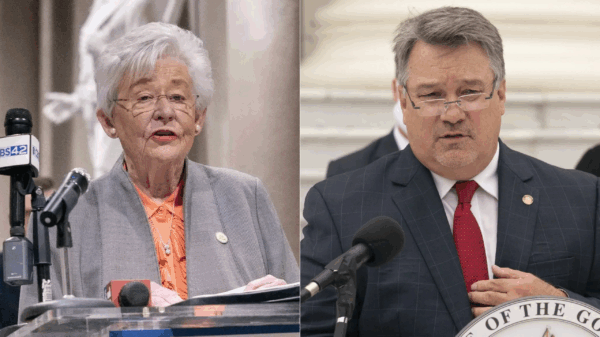The Alabama Court of Civil Appeals heard arguments last week in the Department of Public Health’s appeal of a ruling that barred it from regulating freestanding birth centers as hospitals.
The appeal came in Oasis Family Birthing Center et. al. v. ADPH, a case originally filed in 2023 that concerns whether ADPH had the authority to issue a rule requiring freestanding birth centers to obtain hospital licenses.
ADPH has argued its proposed regulations are necessary to ensure the safety of birth center facilities and the services they provide. Birth center plaintiffs, alongside the ACLU, argued in the case that ADPH was never granted authority by the Alabama legislature to regulate birth centers, and that the Alabama Board of Nursing and Board of Midwifery are the proper authorities for regulating birth center care.
The plaintiffs have described the proposed regulations, which would require that a physician or medical director be present for facility oversight and that a facility must be within 30 minutes of a hospital with OB-GYN services, as burdensome restrictions on birth center operations that would prevent their expansion into maternity care deserts.
The Montgomery Circuit Court, in May, judged that ADPH was not given the authority to regulate birth centers by the Alabama legislature and struck down the agency’s ruling on birth centers.
Oral arguments for the appeals presented by ADPH and State Health Officer Dr. Scott Harris were heard Monday of last week.
ACLU attorney Whitney White spoke in favor of Oasis Birth Center and the additional appellees, while attorney Hunter Sims presented arguments on behalf of Harris.
“It should come as no surprise that the department is regulating these facilities, as they previously did so from 1987 to 2010, and Alabama is not alone in this effort, as 41 other states also regulate freestanding birth centers,” Sims said. “Despite this evidence, the circuit court improperly enjoined the department from requiring the plaintiff’s birth centers to obtain a hospital license.”
Sims explained that ADPH’s stance in the case is that the generally available obstetrical care the department was tasked with regulating in 1949 includes midwifery care provided at birth centers. The statute, however, does not define what forms of care are included in obstetrics.
“Currently, the facilities are operating without any state oversight, and the department has been prevented from ensuring the health, safety and welfare of those that utilize the birth centers,” Sims argued.
The attorney also argued that since birth centers advertise their services to the public and accept patients who meet their criteria, they constitute a generally available medical service, and highlighted that the Boards of Midwifery and Nursing are only able to license and regulate individual practitioners, not facilities.
White argued on behalf of appellees that birth centers are not engaged in providing obstetrical care, which can only be practiced by physicians under Alabama law, and since birth centers only offer care to a “subset of pre-screened, low-risk pregnant women,” they do not meet the definition of a generally available service.
“This case is not about whether midwifery care and birth centers will be subject to state oversight,” White said. “It already is, and will continue to be, no matter what happens here.”
“The Board of Nursing and the Board of Midwifery have authority over the licensed individuals. It’s true that they don’t license the facility itself, but this is the exact same model of care that exists, for example, in office-based surgeries,” she added.
White argued that although birthing centers are unlicensed by a regulating body such as ADPH, national standards of care incorporated into nursing and midwifery board regulations set standards for midwifery care.
“In the context of out-of-hospital care, midwives have to ensure that they’re operating in a safe and clean and hygienic environment, someplace with enough space to safely attend a birth, to safely care for mother and baby with adequate emergency plans,” she said. “If a midwife is operating in a substandard facility, the board would be able to take action against the midwife for that, and that is exactly the same as what happens in office-based surgeries.”
White also highlighted that the legislature has passed no laws requiring freestanding birth centers to be licensed by ADPH.
“We’re not disputing that if the legislature wanted to decide that the department should license freestanding birth centers. It could do that, but we are arguing that under the plain text of the statute as written, and the way it needs to be enforced right now, the scope of the statute simply doesn’t reach this care,” she said.
White told APR that ADPH’s regulation attempts would impose unneeded and burdensome regulations on birth centers currently operating in the state.
“[ADPH] have been attempting to impose regulations that would be incredibly burdensome for birth centers to have to operate under, and these regulations are not medically necessary,” White said. “The care that’s being provided in birth centers is low-intervention care. It’s focused on physiological birth. It’s focused on low-risk patients. It simply isn’t clinically required for these facilities.”
“This is a model of care that is working for Alabama families, and that is an important part of making sure that everyone has access to the pregnancy care that they need,” she continued.
White went on to argue that expanding access to birth centers is an important step to improving maternal health outcomes in Alabama and closing coverage gaps.
“Alabama is facing a really serious maternal and infant health crisis right now,” she said. “The outcomes for pregnant folks and their babies are scary, and there are major parts of the state that are maternity care deserts where there aren’t access to pregnancy care providers at all.”
“We also know that these dangers and these harms are not equally shared. Black families in particular are being disproportionately harmed. Folks in rural areas of the state are facing really long travel distances,” White added. “Birth centers and midwives are an important way to open up an additional point of access in communities that really need it.”
Plaintiff, Dr. Yashica Robinson, an OBGYN and the founder of Alabama Birth Center in Huntsville, similarly told APR that ADPH’s attempt to regulate birth centers would negatively impact the ability of birth centers to fill care gaps.
“We’re opposing that ruling because it takes away an essential component of health care for moms and babies, which can make a big difference when it comes to this maternity care crisis that we’re facing here in Alabama,” Robinson said.
“It can be more difficult to open a hospital or to, you know, to be able to bring these services to the community, but training a midwife and getting midwives that can go into these maternity care deserts, that is something that is more achievable and will be able to help improve outcomes,” she added.
Alabama Birth Center began operating more than a year ago, following a preliminary injunction that, prior to the Montgomery court’s May ruling, temporarily halted ADPH’s birth center rule.
Robinson explained that to open the Alabama Birth Center, which employs a team of medical professionals licensed as Registered Nurses, Certified Professional Midwives, or Certified Nurse Midwives, the center had to undergo numerous regulatory steps.
The center obtained a business license from the city, completed inspections to ensure the facility met Madison County building safety codes for facilities providing medical care and, since opening, has followed American Association of Birth Centers guidelines for birth centers.
Robinson went on to describe the care provided at birth centers as “very patient-centered and very, very individualized.”
“It’s more honed into meeting the needs of the individual client, and that’s really important, you know, in being able to achieve good outcomes for moms and babies, not just as far as the health care outcomes, but patient satisfaction makes a huge difference as well.”
During oral arguments, Sims, in response to the plaintiffs’ argument that greater access to birth centers will help improve maternal health outcomes in Alabama, argued that ADPH’s proposed regulations are necessary to ensure the quality of care provided through birth centers.
“In just about every brief that the plaintiffs filed with the circuit court and in their brief with this court, they’ve blasted the state of maternal health in our state of Alabama, both in access to care and health outcomes,” Sims said.
“The department would respond that they are certainly focused on maternal health and have spent extensive time and efforts to improve the same, and it was with this idea of maternal health in mind that the department enacted regulations to ensure that these facilities, which care for expecting mothers and deliver babies, meet certain standards,” he added.
Messages requesting comments on the case from the Alabama Attorney General’s Office were left on Monday.
A date is not currently set for when the appeals court will release its opinion on the appeal.
“We should have an opinion to you, I won’t say shortly, but at some point, in the near future,” Alabama Civil Court of Appeals Presiding Judge Terry Moore told the court.


















































